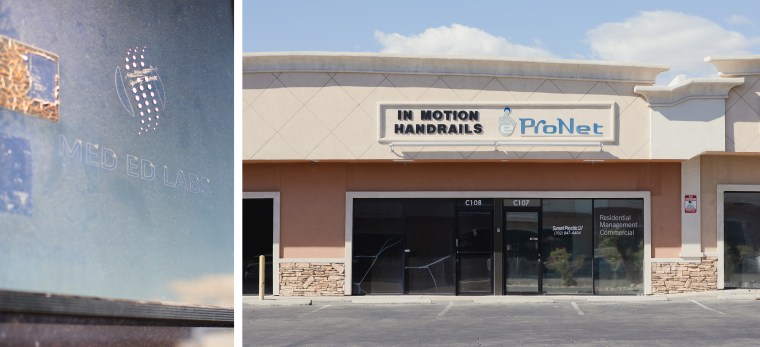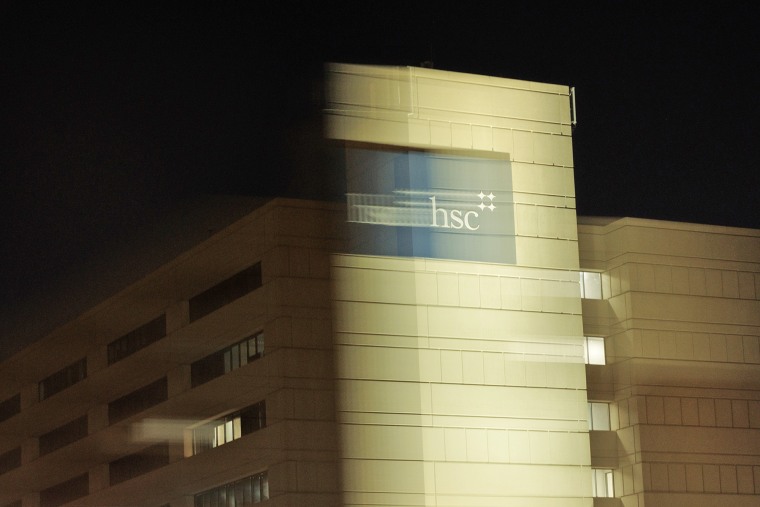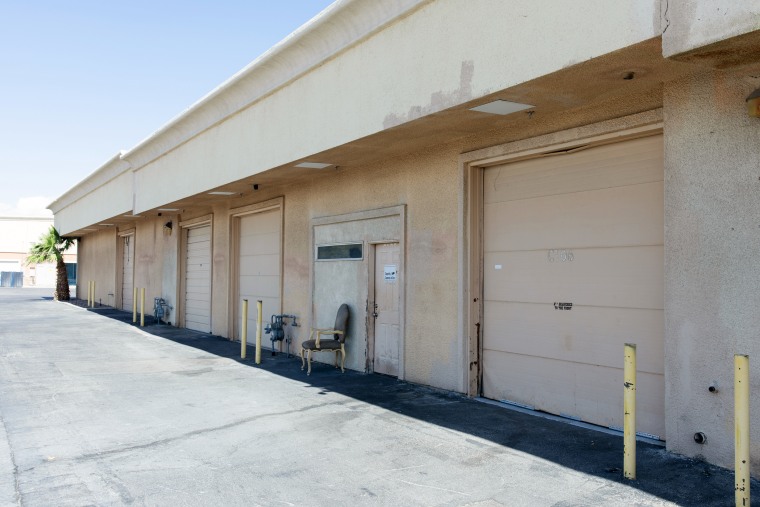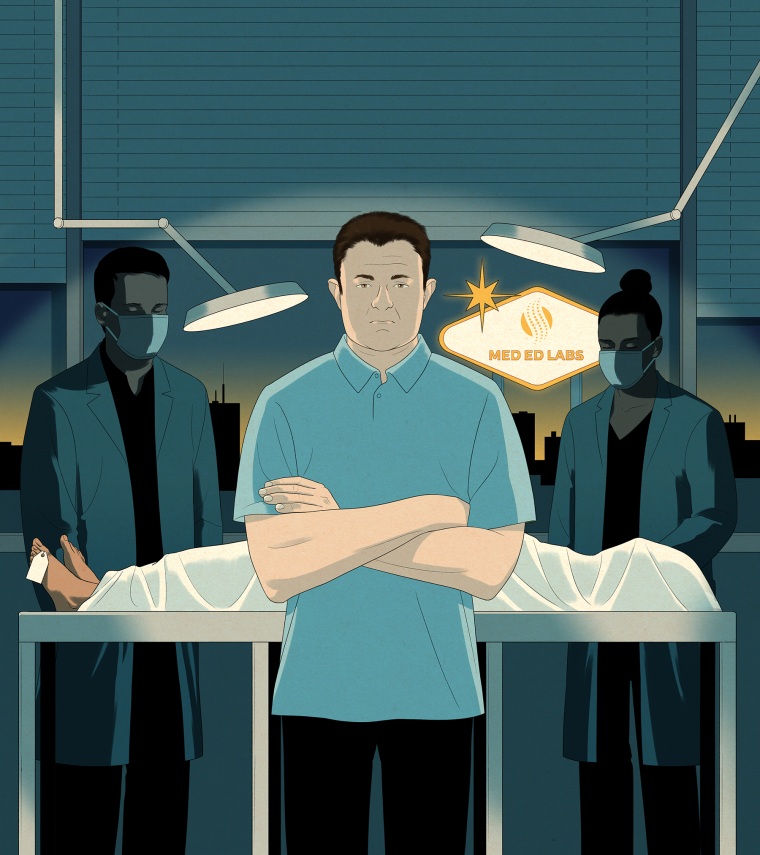This article is part of “Dealing the Dead,” a series investigating the use of unclaimed bodies for medical research.
LAs VEGAs — Obteen Nassiri was in need of a new line of work. After losing his chiropractor’s license following allegations that he had misled patients and defrauded insurers out of millions, he dove into an industry with virtually no guardrails or barriers to entry — the shadowy U.s. body trade.
Operating out of a beige strip mall in Las Vegas between a tattoo parlor and a psychic, Nassiri’s new company, Med Ed Labs, acquired corpses from funeral homes and medical schools, then sold or leased them at a markup to groups seeking human remains for medical training, including the U.s. military.
Within just a few years, he had built a national network of suppliers and clients. He also left a trail of scandal and alleged ethical failures, including complaints that he mishandled human remains.
Like in 2023, when a university expressed concern that Nassiri had failed to return nearly 20 feet. Or when he shipped remains in dirty and disintegrating containers, with one box likened to “scrap cardboard.” Or when he supplied a World War II veteran’s body for an event in which members of the public paid $500 to watch it be dissected in a hotel ballroom, drawing the fury of the man’s family.
His widow told NBC News at the time that when she donated her husband’s body to Med Ed Labs, she didn’t expect it to be “put on display like a performing bear or something.”

What unfolded at Med Ed Labs was made possible — and was concealed — by a near total lack of state and federal oversight of the body industry, experts say. This absence of regulation has led to sometimes grotesque and callous treatment of human remains, an NBC News investigation found.
And the issue goes far beyond Nassiri. Over the past two years, NBC News has uncovered pervasive abuses of America’s dead and disregard for the wishes of survivors.
In Mississippi, reporters discovered that poor people were regularly buried in graves marked only by a number, even as their loved ones reported them missing and frantically searched for them. In Texas, reporters revealed that people’s bodies were cut up and used for research without anyone notifying their closest relatives that they were dead — much less offering them a chance to consent. In other instances, people willingly donated their bodies to science, only for their families to later learn that their body parts were used in ways they never would have approved.
“This is an industry that’s almost entirely unregulated,” said Tanya Marsh, a professor at the Wake Forest University school of Law. “It doesn’t fit within the regulatory structure of the health care industry. It doesn’t fit within the regulatory structure of the funeral industry. And it just doesn’t really seem like anybody is watching the folks who are engaged in this.”
Nassiri’s rise in the body business illustrates how much can go wrong in this system, with horrifying consequences for those who later learn their relatives were treated as commodities, NBC News found.
In interviews, Nassiri denied wrongdoing and blamed his legal troubles on having hired bad lawyers. He said that after starting the company in 2015, he sought to treat each body entrusted to him with dignity.
“We treasure, we respect our donors,” Nassiri said. “It’s a precious gift.”
While it’s illegal in the U.s. to sell organs for transplants, there is nothing to stop the sale of human remains for education or research.
In this void, the national body trade has flourished, fueled by tens of thousands of Americans who donate their bodies or the bodies of relatives each year, often enticed by the promise of free or discounted cremation after the bodies are used. Body brokers — also known as nontransplant tissue banks — have sprung up across the country to capitalize on these gifts.
Defenders of the body trade say that human specimens are essential for educating students and doctors. But critics argue the lack of oversight opens the door for abuse.
Funeral directors can be disciplined for mishandling bodies, but in most states there are no rules requiring body brokers to treat human remains with dignity. No education or licensing is required to enter the industry. And throughout most of the country, no government agencies have the power to hold companies to even minimal standards.
If you own a power saw, “you can run a body broker business,” said Thomas Champney, an anatomy professor at the University of Miami Miller school of Medicine who researches the ethical use of human bodies.
“It’s not surprising to me,” Champney said of Nassiri, “that someone who fraudulently takes money from people would find this as an easy way to make extra funds because of the general lack of regulations."
Dozens of bodies used by Med Ed Labs came from a Fort Worth-based medical school, the University of North Texas Health science Center. As part of a broader investigation into the center’s body donation program, NBC News obtained hundreds of emails detailing its business dealings with Med Ed Labs, providing an unvarnished view inside the body industry and revealing how the state-run medical center overlooked ethical concerns to continue working with Nassiri. The program made at least $82,000 leasing bodies to Med Ed Labs over two years, according to university financial records.
Time after time, Med Ed Labs made mistakes that raised concerns among the Health science Center’s staff members, from improper paperwork and delayed payments to the mishandling of human remains.
Eventually, the problems with Med Ed Labs caught the attention of the state authorities, who issued a warning.
In a November 2021 email, a Texas official who oversaw state body donation programs alerted the Health science Center that Med Ed Labs was accused of “absolutely unethical treatment of donated bodies.” The official added, “I would strongly encourage each of you to seriously evaluate the value of doing any further business with MedEd Labs.”

An email like that might have sunk a vendor in any other business. In fact, as Andy North, a Health science Center spokesperson, recently told NBC News of the center’s work with Med Ed Labs: “This should never have happened, and we will ensure it never happens again.”
But back in late 2021, Nassiri apologized — not for the first time — and promised to make changes, emails show.
And, two months later, the Health science Center offered him yet another chance.

Nassiri was born in Iran and grew up in Las Vegas. As he contemplated a career path, he said he took inspiration from his father: He, too, wanted to be a doctor and help people.
As a chiropractor, Nassiri said, he built a life of prosperity. But it all began to fall apart in 2008.
That year, the Allstate Insurance Co. sued Nassiri in federal court, accusing him of running a fraudulent scheme to fake medical records and bill the company for unnecessary tests and treatments provided to more than 150 people who’d been involved in car accidents. He lost his chiropractor’s license two years later when a Nevada licensing board found that he and an associate had engaged in “fraud, misrepresentation, and deception as part of their regular business practices.”
For years afterward, Nassiri, now 55, continued treating patients without a license, records show, prompting the state board to threaten him with criminal charges.
In 2015, a panel of federal judges upheld an $8.6-million fraud judgment against Nassiri in favor of Allstate — a ruling that he said “pretty much destroyed everything I’ve worked so hard to build,” according to a biographical video he posted online.
It was around then that he found his new path. He and his brother-in-law filed paperwork to start Med Ed Labs, registering it as a nonprofit corporation. His brother-in-law — whose background is in construction — was listed as the sole owner, but Nassiri was in charge of the company’s operations, records show.
Unlike becoming, say, a hairdresser, massage therapist or social worker, Nassiri’s entry into the body business required no formal training, no state certification and no professional license.
In 2019, Nevada passed a law giving the state Board of Health power to regulate companies like Med Ed Labs — one of only a handful of states to do so. But five years later, the agency is still drafting proposed standards and has yet to begin enforcement.
“It’s not a weird industry. It’s not bad,” Nassiri told NBC News of his decision to get into the body trade. “It’s just, it’s got to be done right, like anything else.”
Early on, however, there were signs Nassiri wasn’t following his own advice. For example, the IRs revoked Med Ed Labs’ nonprofit status after it failed to file financial disclosures for three years.
In 2020, Allstate sued Nassiri and his company, alleging he was using Med Ed Labs’ corporate accounts for personal expenses, including family vacations, shopping trips, household bills and his wife’s false eyelashes. The scheme, Allstate alleged, was meant to hide his true income to avoid paying his earlier fraud judgment tied to his work as a chiropractor — an allegation that Nassiri has denied.
When asked in a deposition why Med Ed Labs made purchases at Petsmart, Nassiri said metal bowls sold at the store were good for holding human heads when teaching students to perform Botox injections, according to a transcript. When pressed about company expenditures at sephora, he said makeup from the high-end beauty supplier can help improve the appearance of bodies used in medical training. Company purchases at the luxury department store Nordstrom? Those could have been for employee uniforms, he testified.
Nassiri said he could not explain why Med Ed Labs had also spent money at a movie theater, a tennis club and a foot spa, the transcript shows. The lawsuit remains pending.
Meanwhile, Nassiri built what appeared to be a thriving business, with annual revenue topping $2 million by the company’s third year, according to financial records. From 2019 to 2021, the U.s. Army and the Defense Health Agency, which manages military hospitals and clinics, awarded Med Ed Labs contracts totaling more than $570,000 to supply bodies for medical training, according to a government website. He also landed deals with medical technology companies to provide bodies to train doctors.
Army and Defense Health Agency officials said they were not aware of the fraud allegations against Nassiri or Med Ed Labs before ordering bodies from the company. some of the federal contracts were later terminated, including at least one that was canceled after Med Ed Labs failed to deliver.
To try to meet the growing demand, Nassiri turned to the University of North Texas Health science Center’s Willed Body Program. While Med Ed Labs was struggling to find enough bodies to keep up with clients’ orders, the Health science Center had the opposite challenge — an influx of hundreds of unclaimed bodies a year from two local counties. An NBC News investigation this year revealed that the Health science Center had cut up and leased out hundreds of unclaimed bodies without consent from the dead or their survivors.
On paper, the partnership with Med Ed Labs was a win-win. But in an interview, Nassiri said he didn’t realize some of the bodies he leased from the center were unclaimed. “In our industry,” he said, “what they did, that is the absolute way not to do this.”
Med Ed Labs orders were streaming into the Health science Center as pandemic restrictions lifted in 2020 and 2021, records show: six torsos for a surgeon training in Malden, Massachusetts. Five sets of arms for a shoulder surgery course in King of Prussia, Pennsylvania. six pairs of legs for a medical implant training in Chicago. A dozen bodies for a military medical school in Bethesda, Maryland. Two torsos for a spinal surgery meeting in Honolulu.
In a single order in April 2021, Nassiri requested nearly 100 bodies to be shipped to san Antonio over a one-year period to satisfy one of his military contracts.
The center charged Nassiri a standard rate for each specimen: $600 for a head. $300 for a pair of feet. $500 for a set of arms. $1,000 for a whole body.
It’s unclear from the records how much Nassiri charged his clients — and he declined to say — but experts with knowledge of the industry say bodies typically go for $3,000 to $5,000 apiece, though prices can sometimes reach $10,000.
The Health science Center’s staff worked dutifully to fulfill each of Nassiri’s requests, even as they began to clash with him over abruptly canceled orders and sloppy paperwork, emails show.
Those frustrations appeared to boil over on July 13, 2021, when the manager of the Willed Body Program at the time, Claudia Yellott, wrote Nassiri expressing outrage over a shipment of ashes the center had just received. (Under its agreement with the program, Med Ed Labs was often responsible for cremating bodies before returning them to Texas.)
The company had shipped the ashes via FedEx — which has a policy against transporting human remains — inside containers that Yellott described in an email as “reused boxes.”
“I am not sure if this is the first time that you all have ever sent ashes out but I need to make you aware that the way these ashes were sent back to me is not legal or ethical,” Yellott wrote.
The Health science Center fired Yellott in september following NBC News’ investigation. she did not respond to messages.
In the summer of 2021, Nassiri tried to smooth things over. He told Yellott he had “no idea” human remains could be shipped only through the U.s. Postal service and said he would do better moving forward.

In August 2021, the state Anatomical Board — a now-defunct agency that loosely regulated body donation programs in Texas — fielded a complaint about Med Ed Labs from another Texas medical school.
UTHealth Houston had leased four bodies to Med Ed Labs. But when the company shipped them back to Houston, it sent a fifth unidentified and badly decomposing corpse. The extra body — packaged in a box that, according to one official, resembled cardboard pulled out of the trash — hadn’t come from Houston and shouldn’t have been delivered to the school, emails show.
Kurt Clark, the anatomical services manager of UTHealth’s body donation program, was so disturbed that he called campus security and asked to have the delivery driver “arrested for abuse of a corpse,” according to an email he wrote later.
A spokesperson for UTHealth confirmed that Med Ed Labs had tried to deliver a fifth body that did not come from the university and said the program refused to accept it.
The state Anatomical Board, which had little power to regulate private companies, took no formal action against Med Ed Labs. John Hubbard, the board’s chair, said in an email at the time that the incident showed “what can happen when we allow these entities to operate without regulatory oversight” and that it demonstrated the “reason that we need greater enforcement authority.”
The state Anatomical Board’s regulatory duties have since been transferred to the Texas Funeral service Commission. Hubbard didn’t respond to written questions.
The Health science Center, meanwhile, sought to limit its partnership with Med Ed Labs. It agreed to continue supplying Nassiri, but only if bodies leased from the center stayed in Texas, where it would have more control over how they were used.
There was one problem, though: Med Ed Labs was still holding more than 30 of the center’s bodies in its “maxed out” Las Vegas freezers, according to emails. Yellott and her staff were concerned that Nassiri was using the corpses in ways the center hadn’t approved.
For the next six months, as some family members were writing to the Health science Center asking when their relatives’ remains would finally be returned, Nassiri repeatedly failed to cremate the bodies and ship the ashes as promised, emails show.
sammy Rodriguez, who donated the body of his ex-wife, Lynn, to the Health science Center after her death at age 62 in April 2020, was among those contacting the program that fall, asking when he could pick up her long-delayed remains.
Rodriguez said he thought his ex-wife’s body had been used to train medical students in Fort Worth. But records obtained by NBC News show otherwise.
Rodriguez was outraged when he learned from a reporter last month that her body had been leased out to Med Ed Labs for about $1,000 and shipped to Las Vegas. It’s not clear from the records how her body was ultimately used.
“They didn’t tell me none of that,” he said. “Now I’m just wondering if the ashes that I got were actually her ashes.”
Nassiri and the Health science Center didn’t answer questions about Rodriguez’s case.
In October 2021 — the same month Rodriguez was seeking answers from the Health science Center — Med Ed Labs landed in the national spotlight.
Attendees at the Oddities and Curiosities Expo in Portland, Oregon, paid to watch a retired anatomy professor dissect the body of David saunders, a 98-year-old Army veteran. A local TV news crew went undercover to document the event.
“It’s horrible what has happened to my husband,” saunders’ widow, Elsie saunders, told NBC News at the time. “I only consented to body donations for scientific purposes. That’s the way my husband wanted it. To say the least, I’m upset.”
In a statement posted to its website in 2021, Med Ed Labs said it had “no prior knowledge” that Death science, the company that paid to use saunders’ body, would be staging a pay-per-view dissection. Death science disputed that claim, saying in a statement that it was in close communication with Nassiri while planning the event and had disclosed the plan to sell tickets.
After the scandal made national and international headlines, officials at the Health science Center sent Nassiri and his staff urgent emails asking for a full accounting of any bodies still in the company’s possession.
“In light of recent media involving Med Ed Labs we have been instructed to gather this information and coordinate the return of all specimens and ashes,” Yellott wrote.
But one month later, Yellott again agreed to give the company another opportunity. The Health science Center entertained requests for bodies from Nassiri over the next two years, though he failed to complete any of the purchases.
The fallout of the center’s business dealings with Med Ed Labs continued. In December 2023, a Health science Center official wrote to notify Nassiri that an internal audit had found that the center was missing nine pairs of ankles and feet that had been sent to Las Vegas more than two years earlier.
It’s unclear from the emails if the feet were ever found, and Nassiri told NBC News he had no memory of the incident. The Health science Center didn’t answer questions about the status of the missing appendages.
In september, the Health science Center suspended donations to its Willed Body Program and fired Yellott and other officials who ran it following NBC News’ investigation into the center’s use of unclaimed bodies.
North, the Health science Center spokesperson, didn’t answer detailed questions about the center’s relationship with Med Ed Labs. In a statement, he said an outside consulting firm was investigating “previous programmatic and management failures” at the center’s body donation program, which he said fell short of “the standards of respect, care and professionalism we demand.”
Broader efforts to rein in the body industry have also fallen short. A bipartisan bill to impose federal regulations failed to advance in Congress last year. A Texas state senator, meanwhile, has pledged to reintroduce legislation next year to give the Texas Funeral service Commission more power to regulate body sales.
speaking to a reporter in October, Nassiri said Med Ed Labs was no longer in business. It had filed for bankruptcy on March 15 — just days before Allstate’s lawsuit against Nassiri and the company was set to go to trial.

But an NBC News review of corporate filings suggests that Nassiri may still be active in the body trade.
In January, a new body broker business, surgical & Medical Training services, was registered at Med Ed Labs’ former Las Vegas address. Nassiri isn’t listed on documents filed with Nevada’s secretary of state, but his brother is.
Nassiri didn’t respond to questions about the company, but there are other indicators that he may be involved in the new business: The company’s webpage appears to be a direct copy of Med Ed Labs’ site, with some URLs still mentioning the former company’s name. Nassiri paid an application fee to open a cremation and body donation service last year at the former Med Ed Labs address. And social media icons on the surgical & Medical Training services website link to Nassiri’s personal pages on Instagram and Facebook.
Those social media pages no longer mention his work as a body broker but instead promote his newest venture — as a self-help guru.
Nassiri advertises what he calls the seven Fs, or foundations, of a healthy life: faith, family, friends, fitness, fun, financial security and fortitude.
In a recent series of posts, he shared several inspirational quotes, including one attributed to Thomas Edison.
“The most certain way to succeed,” he wrote, “is always to try just one more time.”
Mike Hixenbaugh reported from Washington, D.C., susan Carroll from Houston, Liz Kreutz from Las Vegas and Tyler Kingkade from Los Angeles.



